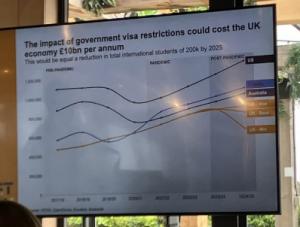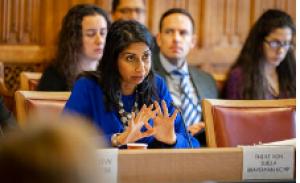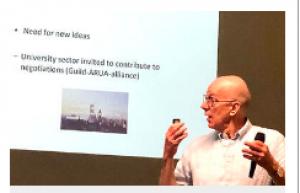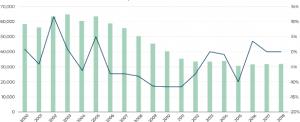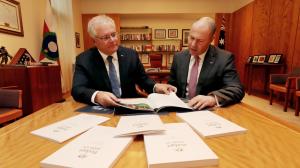Rising costs of living are affecting the mobility of international students, and many are reconsidering decisions to study abroad, according to a survey of 21,000 students in 108 countries conducted by IDP Connect, an educational marketing and student recruitment firm.
The survey, ‘Emerging Futures3’, carried out between February and March 2023, examined the attitudes and intentions of students and found that financial concerns were uppermost in students’ minds.
The top 10 countries in the sample, in terms of total participants, were Nigeria, India, China, Ghana, Philippines, Pakistan, Kenya, Nepal, Bangladesh and Indonesia, while the survey considered six potential destinations, namely, Canada, Australia, the United States, United Kingdom, New Zealand and Ireland.
Key findings showed that 81% of the students were looking for opportunities to work part-time during their studies to help them to afford their stay in host countries, while 51% said they were reconsidering their decision to study overseas due to recent increases in the cost of living.
According to the study, 71% of the students said they wanted help to get part-time work while 31% said part-time work would be their main source of funding their studies. A total of 63% of students stated that post-study work is the most influential factor as to where to study.
In that context, 72% of students said they would apply for work visas, while 44% said they would consider changing their study destination if the duration of the work visa were to be shortened.
Transparency about the cost of living
Commenting on the issue, Simon Emmett, the IDP Connect chief executive officer, pointed out that, as the cost of living increases in most countries, students will need more support and guidance.
“The students are looking to institutions to support them in finding part-time jobs and to provide clear and transparent guidance about the total cost of their education,” said Emmett.
Highlighting similar concerns, ICEF Monitor, the market intelligence platform for international student recruitment, noted in a briefing issued on 26 April that inflation had been chipping away at the spending power of families in dozens of countries across the world.
According to ICEF, currency crises in some student-sending markets are contributing to parents having to make alternative choices on study destinations for their children. The issue is that, as students’ families struggle to make ends meet, they may have to forgo or defer plans for overseas study, or choose Plan B options that are more affordable than their first choice preferences.
In this regard, heightened price sensitivity in both receiving and sending could lead to families being more open to a wider range of destination countries, institutions, academic programmes and even the types of study.
For instance, in the past year, rising costs of food and accommodation in major host countries have been affecting international students, according to ICEF, and there are no indicators that the situation will improve in the near future.
What this means is that, although the demand for study abroad is expected to be high this year, with countries such as Canada, the UK, Germany, France and the US looking forward to enrolling large numbers of students from emerging markets, there are indicators that this trajectory is being challenged by financial pressures affecting many families, especially in many African countries.
Currency crises
Caught in this situation, for example, are families in Nigeria, the top African country of origin for international students, where inflation and a currency crisis are creating uncertainties for students who would like to study in Europe or the US.
According to the Study International platform that provides universities and students with information, news and resources about international education, high inflation and the weakening of the naira (the Nigerian currency) that currently stands at NGN462 per US dollar, is damaging plans for students interested in studying abroad.
Expressing frustration on Twitter, one student said: “In light of naira devaluation, self-funding is becoming increasingly difficult. Can the average person still self-fund their studies abroad?”
But, according to ICEF, a similar situation prevails in Ghana where inflation is the most significant challenge to those interested in travelling abroad for higher education.
In this case, although the number of Ghanaian students in Canada rose by 88% in 2022 to 3,745 while the US enrolled 16% more in 2022 for a total of 4,915, ICEF said, the rapid recruitment might not be sustained, as this year will be difficult for most Ghanaian households.
“Real GDP growth will slow in 2023 as rising consumer prices and monetary tightening weigh on private consumption and investment and as government spending declines,” stated ICEF, quoting an Economist Intelligence Unit’s forecast on Ghana.
Local quality may keep students at home
There might be a silver lining for some Global South countries. South Africa, for instance, has good universities and has kept outbound mobility relatively low. Taking into account that the IDP Connect survey identified high quality of education as a primary factor in students moving out of their countries of origin, it is an indicator that South Africa might be able to attract more foreign students from other countries in Sub-Saharan Africa and beyond.
Similarly, Morocco is also a hub for foreign students from North African countries, as well as their counterparts from Gabon, Mali, Côte d’Ivoire, Guinea and Senegal. According to ICEF, Morocco’s growing popularity among African students is based on its flexibility of degree programmes that are available in Arabic, English and French.
But, in contrast to South Africa, which has a relatively small number of outbound students, Morocco has more than 63,000 of its outbound students studying abroad in institutions in France, Canada, Germany and Ukraine, among other countries.
Egypt, which is another growing market for various outbound student destinations, and which had also recently been affected by currency devaluation, inflation and high cost of living, had been attracting international students from United Arab Emirates, Germany, Turkey, the US, Saudi Arabia and Ukraine.
To boost the quality of the education system in order to attract international students, Egypt had been welcoming foreign academic investors, notably from Canada, Germany, the UK and the US, to open full-fledged universities or branch campuses in Cairo.
But, what is hard to tell, is how many students in Sub-Saharan Africa currently could afford to have access to a degree programme costing between US$7,000 and US$15,000 a year in Egypt, or in other outbound destinations where the cost of education is even higher.
Possibly, the solution lies in Global South countries improving the quality of their universities, which could encourage their students to study locally – and even attract foreign students.

Source link: https://www.universityworldnews.com/post.php?story=2023050418313545
























